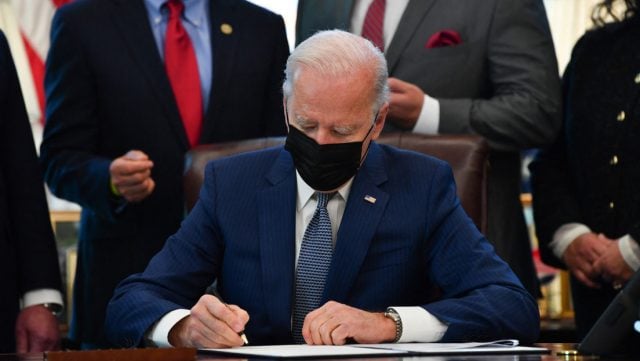US President Joe Biden signed an executive order last week to «ensure the responsible development of digital assets». A decree that broadly implies a call for tightening financial controls on cryptocurrencies.
Although the order is based on the need to mitigate the risks involved in the use of these assets, the text makes clear the three aspects that seem to motivate the White House to move forcefully: prevent cryptocurrencies from being used «to circumvent regimes of sanctions»; the desire to maintain its financial hegemony in the global system and the «maximum urgency» to investigate «possible design and implementation options for a Central Bank» of digital currencies in the US, informs RT.
According to the document, the strategy of the Biden Administration is to mobilize the government framework in six key areas:
* The protection of consumers and investors.
*. Financial stability.
* Illicit financing.
* US leadership in the global financial system and economic competitiveness.
* Financial inclusion.
* Responsible innovation.
“Strengthen US leadership”
This week, several media outlets announced that the executive order on cryptocurrencies was about to come out, and that it would dictate the guidelines to federal agencies for the preparation of policies and regulations on digital assets.
The highlight, without a doubt, is the fact that Washington is evaluating the appearance of a digital currency from the Central Bank and that it has planned a regulation plan that is not only limited to the national sphere, but would also involve its “allies”.
The text published this Wednesday emphasizes the «explosive growth» of cryptocurrencies, «exceeding a market capitalization of 3 trillion dollars last November», and the fact that today «around 16% of the American adults, approximately 40 million people, have invested, exchanged or used» those digital assets.
The context of exponential growth – the text details – «creates an opportunity to strengthen US leadership in the financial system», beyond the risks that these operations may entail, which is why Washington now intends to play a role in «global governance of digital assets consistent with US democratic values and global competitiveness».
In the short term, Biden has ordered the Treasury Department and other agencies to evaluate and develop «policy recommendations» for the sector, which guarantee «efficient supervision» and safeguard «world and US financial stability».
In parallel, the Secretary of the Treasury is instructed to prepare a report «on the future of money and payment systems», now considered a matter of national interest for the United States, as well as the promotion of «equitable access to secure and affordable financial services». In other words, to make traditional (and heavily regulated) banking more attractive in the face of the ‘boom’ of other decentralized alternatives such as cryptocurrencies.
The key ‘areas’ of Biden ‘s order
The objectives of the executive order, for the moment, are concentrated in six key areas, which seek to strengthen the role of the US as a regulator, despite the fact that the system that governs cryptocurrencies was born as an alternative to the centralized transactions of the traditional financial architecture.
Consumer protection
According to the text, consumer protection is a priority for the US administration, «in the absence of sufficient supervision and standards» to control companies that provide digital asset services.
Apparently, in line with the principle of «American exceptionalism», Washington defends its supposed «duty» to guarantee the implementation of safeguards, to prevent «arbitrary or illegal surveillance, which can contribute to human rights abuses».
Financial stability
Another of the priorities of the Biden Administration with this executive order is to «mitigate systemic risk» and guarantee its own financial stability.
In this regard, the Financial Stability Oversight Board is encouraged to identify and mitigate economy-wide financial risks posed by digital assets, and develop appropriate policy recommendations to address any regulatory gaps.
For the US authorities, issuers of digital assets, stock exchanges and trading platforms, and intermediaries whose activities may increase risks to financial stability, must, as appropriate, «be subject to and comply with the regulatory and supervisory standards that govern traditional market infrastructures and financial companies’. This would be done in accordance with the principle of “same business, same risks, same rules”.
Illicit financing
Another issue sought with this executive order is to mitigate illicit finance and national security risks posed by the «misuse» of digital assets, says the document. Among other things, it notes that cryptocurrencies can pose significant risks such as money laundering, cybercrime and ransomware, narcotics and human trafficking, and financing of terrorism and its proliferation.
But here also comes one of the aspects that seem to have motivated the White House in the matter, indicating that digital assets can be used «as a tool to circumvent the financial sanctions regimes of the US and other countries».
In addition, Washington alleges that there are jurisdictions that have not yet effectively implemented the international standards established by the Intergovernmental Financial Action Task Force (FATF), whose purpose is to develop and promote measures to combat money laundering, which would allow criminal actors, including perpetrators of ransomware incidents and other cybercrimes, who often launder and sell cash from dirty deals.
In this way, they justify their insistence on controls. “When digital assets are abused or used illicitly, or undermine national security, it is in the national interest to take steps to mitigate these illicit financial and national security risks through regulation, supervision, law enforcement or the use of other US government resources”, states the executive order.
US leadership in the financial system
«Strengthening US leadership in the global financial system and in technological and economic competitiveness» is another of the priorities of this US policy.
The document mentions the US interest in remaining «at the forefront» of the development and responsible design of digital assets, as well as the technology that supports new forms of payment and capital flows in the international financial system.
At this point, they insist on their determination to establish standards that promote their questioned «democratic values» which they tend to rant about, as well as «the rule of law; privacy; the protection of consumers, investors and companies; and interoperability with digital platforms, legacy architecture and international payment systems”.
Financial inclusion
Biden’s executive order establishes that this policy seeks to promote access to safe and affordable financial services, particularly for those Americans neglected by the traditional banking system.
«Many Americans do not have enough banking services and the costs of cross-border money transfers and payments are high», says the text.
Responsible innovation
The document signed by Biden also indicates that they will seek to support technological advances that promote the development and responsible use of digital assets.
In this regard, they denounce that the technological architecture of different digital assets has substantial implications for “privacy, national security, operational security and the resilience of financial systems, climate change, the ability to exercise human rights and other national objectives».
They also reference the environmental impacts that result from cryptocurrency mining.













